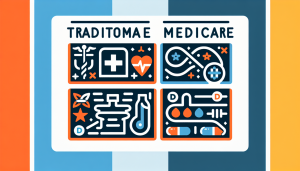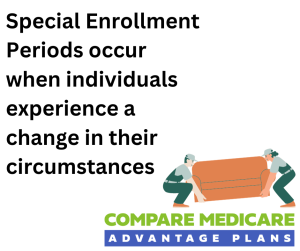When is Open Enrollment for Medicare in 2025?
As the seasons change, another important period looms on the horizon, the enrollment period for Medicare in 2025. This critical phase could allow you to make changes to your current Medicare coverage.
This period would be ideal to reassess your healthcare needs, compare various plans, and choose the one that fits you perfectly. This article will tell you the key dates and the possible changes you could make to your current plans.
Key Takeaways
- Medicare Open Enrollment will annually be held from October 15 to December 7.
- Beneficiaries should carefully evaluate their healthcare needs and compare plans to choose the right Medicare plan.
- Official Medicare resources and State Health Insurance Assistance Programs (SHIPs) will likely be available to help individuals navigate Open Enrollment.
Compare Plans in One Step!
Enter Zip Code
Important Dates for Medicare Open Enrollment in 2025

Each year, the Medicare Open Enrollment period commences on October 15 and wraps up on December 7. This window offers Medicare beneficiaries the chance to make adjustments to their coverage. Beneficiaries can:
- Transition from traditional Medicare to a Medicare Advantage plan
- Alter Medicare Advantage plans
During this period, members could scrutinize their existing coverage, check for any changes in their health or prescription needs, and compare different Medicare plans.
Members should make the most of this period because overlooking the end date for Medicare Open Enrollment could lead to penalties or coverage delays.
However, if circumstances prevent you from making changes during the Medicare Open Enrollment, exceptions are in place.
Start of Open Enrollment
The Open Enrollment for Medicare gets underway on October 15th, each year. This period allows Medicare beneficiaries to:
- Join or switch Medicare Advantage plans
- Modify prescription drug coverage
- Adjust existing Medicare health plans
- Evaluate new plan offerings.
At the start of the Open Enrollment, it’s paramount to scrutinize your current plan’s formulary and familiarize yourself with the associated medication costs. This understanding could enable you to make necessary alterations to your coverage to make sure it aligns with your healthcare needs for the forthcoming year.
End of Open Enrollment
The Medicare Open Enrollment period ends on December 7 of each year. If you miss this deadline, you will likely be automatically reenrolled in your current plan, provided it’s still offered.
However, be aware that prices may change, and late enrollment penalties may apply. You also may not make any changes to your plans after Open Enrollment ends.
Understanding Your Medicare Coverage Options

Medicare coverage may be complicated, but understanding the basics helps. Traditional Medicare, often referred to as Original Medicare, could cover a wide range of services including:
- doctors’ services
- diagnostic screenings
- lab tests
- outpatient care
- preventive services
- certain medical equipment
However, Medicare Advantage plans could act as an alternative. Some of these plans could provide coverage for all inpatient and outpatient services included in Medicare Part A and Part B, except for clinical trials and skilled nursing facility care.
In addition to these, certain plans may also have Medicare Part D prescription drug plans. These could offer optional outpatient prescription drug benefits offered by private plans that enter into agreements with Medicare, potentially helping cover the expenses of prescription drugs for individuals with Medicare.
These plans could either complement Traditional Medicare or be incorporated into a certain Medicare Advantage plan. The particulars of coverage, such as premiums, formularies, and cost-sharing, may differ based on the chosen plan.
Traditional Medicare vs. Medicare Advantage
When selecting either Traditional Medicare or Medicare Advantage, grasping the differences could be paramount. Both offer coverage for all services under Medicare Part A and Part B, but they may vary in terms of out-of-pocket expenses, provider networks, and availability of potential benefits.
Some Medicare Advantage plans will likely exhibit variations in terms of provider networks, prior authorization, and referral requirements, and some may also offer extra benefits such as certain dental and vision services.
When making the decision, you should consider:
- Your personal health and prescription drug needs
- Your financial situation
- Your medical care delivery preferences
- The healthcare providers you wish to consult.
Prescription Drug Plans (Part D)
Medicare Part D prescription drug plans could exhibit differences in terms of:
- Premiums
- Deductibles
- Cost sharing
- The drugs that are covered
- Any utilization management restrictions that apply
- Pharmacy networks
Some plans may enforce utilization management constraints on prescribed medications, possibly including prior authorization, quantity limits, and step therapy.
Making Changes During Open Enrollment

During the Open Enrollment period, beneficiaries have the liberty to alter their coverage.
This could include switching between Traditional Medicare and Medicare Advantage, changing Part D plans, or enrolling in a new plan.
Medicare Advantage Plan Open Enrollment for 2025

Each year, from January 1 to March 31, the Medicare Advantage Open Enrollment offers beneficiaries the chance to alternate between plans or revert to Traditional Medicare.
This period could provide another chance for beneficiaries to optimize their Medicare coverage according to their needs.
Switching Between Traditional Medicare and Medicare Advantage
During the Open Enrollment period, it’s possible to switch between Traditional Medicare and Medicare Advantage.
Whether you’re moving from Traditional Medicare to Medicare Advantage or vice versa, you have the opportunity to reassess your coverage and make a choice that best aligns with your healthcare needs and financial capabilities.
Medicare Open Enrollment Supplemental Insurance

The Medicare Open Enrollment could also allow you to assess supplemental insurance options. One potential option could be Medigap, a type of Medicare Supplemental Insurance policy specifically created to assist beneficiaries in traditional Medicare by covering some of Medicare’s deductibles and cost-sharing requirements.
Another option could be the Part D prescription drug plans. Certain plans may offer coverage for outpatient prescription drugs and may either complement Traditional Medicare or be incorporated into a Medicare Advantage plan.
Another option could be the Medicare Advantage drug plan, which may combine the benefits of both. These supplemental options could be crucial for beneficiaries who may need additional coverage beyond what traditional Medicare provides.
Changing Medigap Plans
Beneficiaries have the option to modify their Medigap plans during the Open Enrollment. However, this decision may be subject to medical underwriting, and premiums could potentially increase based on the beneficiary’s health status.
Furthermore, switching Medigap plans could also lead to increased cost-sharing obligations and potentially higher overall costs.
Therefore, when contemplating a change to your Medigap plan, it’s crucial to take these potential factors into account.
Switching between Medigap and Medicare Advantage plans
Switching between Medigap and Medicare Advantage plans is permitted during Open Enrollment.
You can transition from Medigap to Medicare Advantage, but you should be aware of the potential benefits and drawbacks of each before making a decision.
Some Medicare Advantage plans may offer more benefits and lower premiums, but they may also have more restricted networks of healthcare providers and could potentially incur higher overall costs when compared to traditional Medicare.
Changing Part D Plans
Beneficiaries may alter their Part D prescription drug plans during the Open Enrollment period. This is a crucial decision as alterations to your Part D plan can result in:
- Changes to the drugs that are covered
- Adjustments to cost-sharing amounts such as copayments or deductibles
- Modifications to the available pharmacy network for filling prescriptions.
Special Enrollment Periods and Exceptions
Life is unpredictable and plans can change. For such instances, Medicare provides Special Enrollment Periods.
These periods enable Medicare beneficiaries to make specific coverage changes outside of the Open Enrollment period, as a result of qualifying life events or changes in eligibility.
Even if you’ve missed the Open Enrollment period or undergone a significant life change, you might still have a chance to modify your Medicare coverage.
Qualifying Life Events
Qualifying life events that trigger a Special Enrollment Period include:
- Loss of Medicaid coverage
- Being affected by a natural disaster that prevents enrollment
- Having coverage under a group health plan while still working or when a spouse is still working
- Changing residence
These events could provide beneficiaries with another chance to reassess their coverage and make necessary changes.
Eligibility Changes
Changes in eligibility can also trigger a Special Enrollment Period.
For instance, becoming eligible for Medicaid or experiencing changes in disability status can initiate a Special Enrollment Period, allowing beneficiaries to adjust their Medicare coverage according to their new circumstances.
Financial Assistance and Extra Help Programs
If you’re struggling with Medicare costs, various financial assistance programs could be at your disposal.
The Low-Income Subsidy (LIS) or Extra Help program is a federal initiative that has been designed to assist individuals with restricted income and assets by potentially covering expenses for prescription medications and associated costs.
Meanwhile, Medicare Savings Programs may also help eligible beneficiaries with Medicare premiums, deductibles, and coinsurance costs.
Low-Income Subsidy (LIS)
The Low-Income Subsidy (LIS) program, also referred to as ‘Extra Help,’ is a Medicare Part D initiative that has been designed to assist qualified individuals in covering some of their prescription drug expenses.
This program could potentially reduce certain prescription costs for Medicare enrollees, which may result in substantial annual savings.
Medicare Savings Programs
Medicare Savings Programs (MSPs) are state-sponsored programs that could assist individuals with low income in affording Medicare by covering expenses such as potential Medicare premiums, deductibles, and co-payments.
Tips for Choosing the Right Medicare Plan
Selecting the most suitable Medicare plan will likely be a significant decision requiring meticulous consideration. Here are some steps to help you make the right choice:
- Evaluate your current health status.
- Review your medical history.
- Assess your current prescriptions.
- Consider your coverage choices.
- Consult with healthcare providers.
- Consider your financial circumstances.
By following these steps, you can make an informed decision about your Medicare plan.
Evaluating Your Healthcare Needs
When deciding on a Medicare plan, a comprehensive assessment of your healthcare needs may be necessary. This could involve:
- Assessing your overall health
- Evaluating your current and anticipated healthcare needs
- Ensuring that the selected plan offers the potential coverage and benefits that are in line with your specific health requirements.
Comparing Possible Plans and Costs
Comparing various Medicare plans forms a critical stage in the decision-making journey. You may want to consider potential factors such as:
- Network
- Prescription drug coverage
- Member complaints
- External factors such as health, lifestyle, travel plans, budget considerations, and specific coverage needs
By entering your zip code into any of the zip code boxes on this website, you can compare your potential plans, possible benefits, and costs.
 Resources for Navigating Medicare Open Enrollment
Resources for Navigating Medicare Open Enrollment
A range of resources will likely be available to guide you through the Medicare Open Enrollment period.
Official Medicare resources like the Medicare & You handbook, CMS Outreach and Media Materials, and the NCOA Medicare Open Enrollment Toolkit could provide valuable information about your coverage options.
Additionally, State Health Insurance Assistance Programs (SHIPs) may also offer individualized assistance to Medicare beneficiaries during Open Enrollment.
Official Medicare Resources
Official Medicare resources could offer valuable information that could help elucidate your coverage options. The ‘Medicare & You’ handbook serves as an annual guidebook offering details on Medicare coverage, costs, and services.
State Health Insurance Assistance Programs (SHIPs)
State Health Insurance Assistance Programs (SHIPs) will likely offer personalized health insurance counseling to Medicare beneficiaries.
These programs offer free, unbiased assistance to help you understand your Medicare coverage options and navigate the Open Enrollment process.
Summary
Navigating the Medicare Open Enrollment period may be challenging, but with the right information and resources, you could make informed decisions about your healthcare coverage.
Remember to review your current coverage, evaluate your healthcare needs, compare different plans, and make use of available resources.
No matter your circumstances or needs, there’s a Medicare plan out there that’s right for you.
Frequently Asked Questions
→ What is the Medicare enrollment period for 2025?
Each year, the Medicare Enrollment Period is from October 15 to December 7. During this period, individuals currently enrolled in Medicare have the opportunity to make changes to their coverage to ensure it meets their needs come January 1.
→ What changes can I make to my Medicare coverage during the Open Enrollment period?
During the Open Enrollment period, you can switch between Traditional Medicare and Medicare Advantage, change your Part D plan, or enroll in a new plan to update your Medicare coverage.
→ What is the purpose of the Low-Income Subsidy (LIS) program?
The Low-Income Subsidy (LIS) program is a federal initiative designed to provide financial assistance to individuals with restricted incomes and assets, possibly helping cover prescription medications and associated costs.

ZRN Health & Financial Services, LLC, a Texas limited liability company




 Resources for Navigating Medicare Open Enrollment
Resources for Navigating Medicare Open Enrollment